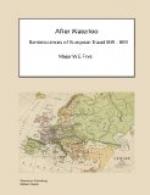This morning I went to visit the field of battle, which is a little beyond the village of Waterloo, on the plateau of Mont St Jean; but on arrival there the sight was too horrible to behold. I felt sick in the stomach and was obliged to return. The multitude of carcases, the heaps of wounded men with mangled limbs unable to move, and perishing from not having their wounds dressed or from hunger, as the Allies were, of course, obliged to take their surgeons and waggons with them, formed a spectacle I shall never forget. The wounded, both of the Allies and the French, remain in an equally deplorable state.
At Hougoumont, where there is an orchard, every tree is pierced with bullets. The barns are all burned down, and in the court-yard it is said they have been obliged to burn upwards of a thousand carcases, an awful holocaust to the War-Demon.
As nothing is more distressing than the sight of human misery when we are unable to silence it, I returned as speedily as possible to Bruxelles with Cowper’s lines in my head:
War is a game, which, were their subjects
wise,
Kings should not play at.
I hope this battle will, at any rate, lead to a speedy peace.
June 28.
We have no other news from the Allied Army, except that they are moving forward with all possible celerity in the direction of Paris. You may form a guess of the slaughter and of the misery that the wounded must have suffered, and the many that must have perished from hunger and thirst, when I tell you that all the carriages in Bruxelles, even elegant private equipages, landaulets, barouches and berlines, have been put in requisition to remove the wounded men from the field of battle to the hospitals, and that they are yet far from being all brought in. The medical practitioners of the city have been put in requisition, and are ordered to make domiciliary visits at every house (for each habitation has three or four soldiers in it) in order to dress the wounds of the patients. The Bruxellois, the women in particular, have testified the utmost humanity towards the poor sufferers. It was suggested by some humane person that they who went to see the field of battle from motives of curiosity would do well to take with them bread, wine and other refreshments to distribute among the wounded, and most people did so. For my part I shall not go a second time. Napoleon, it is said, narrowly escaped being taken. His carriage fell into the hands of the Allies, and was escorted in triumph into Bruxelles by a detachment of dragoons. So confident was Napoleon of success that printed proclamations were found in the carriage dated from “Our Imperial Palace at Laecken,” announcing his victory and the liberation of Belgium from the insatiable coalition, and wherein he calls on the Belgians to re-unite with their old companions in arms in order to reap the fruits of their victory. This was certainly rather premature, and reminds me




